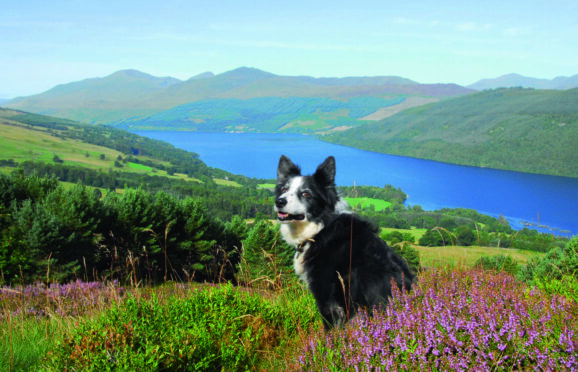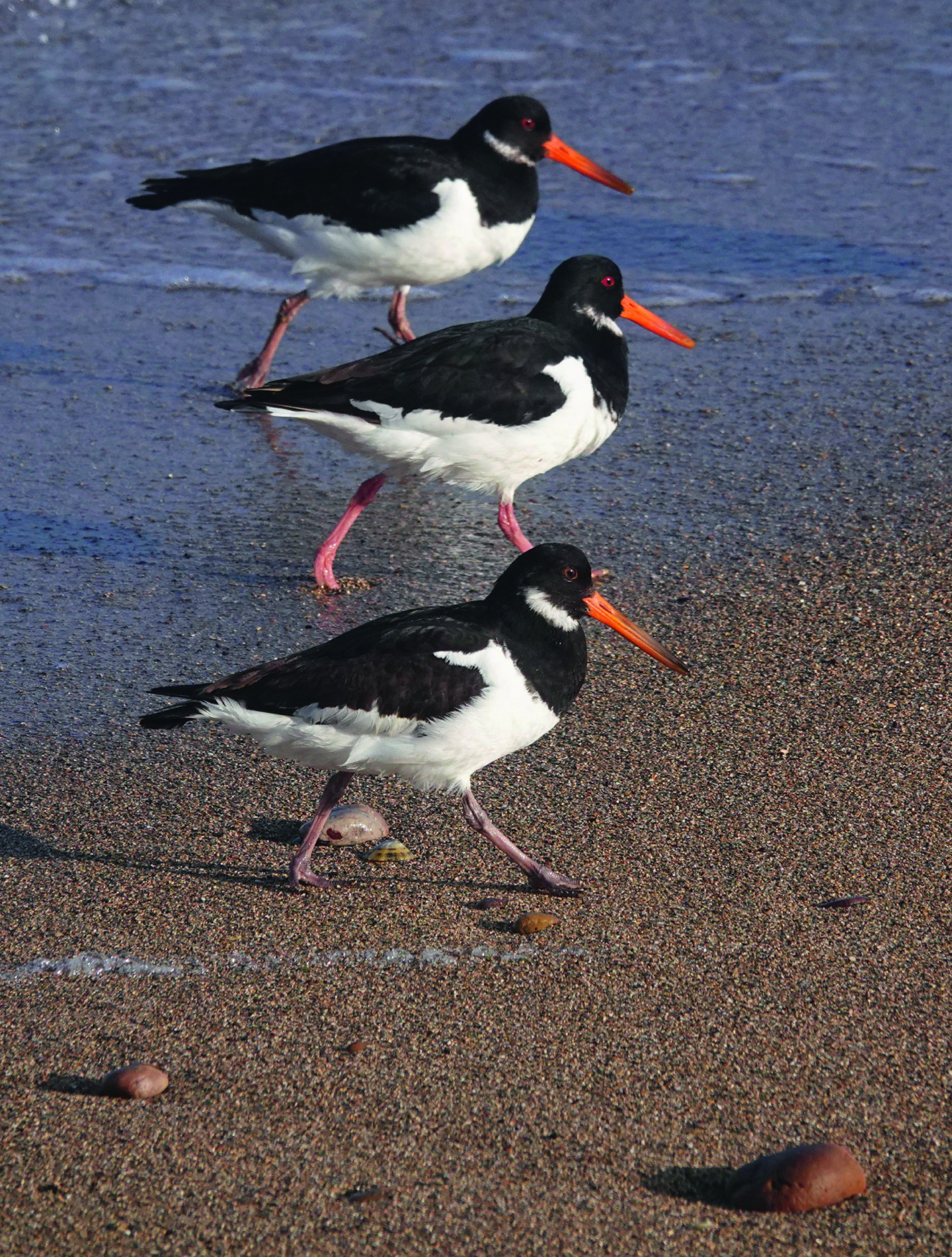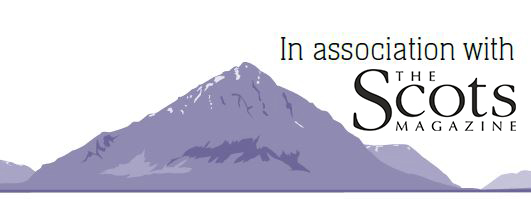
Standing on the beautiful Fife Coast Path, close to Crail, I watch oystercatchers, redshanks and turnstones feasting frenetically on invertebrates beside waltzing seaweed on the tide line.
Glowing apricot light gilds foaming waves while eider and mallard congregate, and gulls hang in a boisterous breeze.
As another winter day draws to a close, this is a vital time for birds to fuel up before nightfall. Without sustenance, they may be unable to tolerate sub-zero temperatures or severe weather.
I have been taking photographs and chasing elusive sun all day – now that fickle light is momentarily perfect. I am lost in avian bliss, watching, listening, and relishing the birds’ activity. My hands are numb, and hunger gnaws but, like the shorebirds, I do not want to miss one moment before the sun sets.
A couple of dogs appear at the far end of the beach – they race one another, chasing randomly in all directions, rushing through the sea, barking crazily at the birds. My avian vignette shatters like splintering glass as winged shards erupt skywards.
I feel angry and upset – yet this disruptive scenario plays out most days on beaches, shorelines and numerous other critical places of nature.
We love our dogs and, since the pandemic, more and more of us have become dog owners because close relationships with canines are known to help alleviate anxiety and loneliness and, in turn, assist with our mental stability. I understand – I have had dogs all my life, and I love them passionately.
They do offer unsurpassed companionship and help keep you fit through their need for exercise, ensuring you head outside, even in the worst weather. Many who live alone, particularly the elderly, will tell you that their dogs give them a reason to get up in the morning.
Dogs matter to us.
We all love to give our dogs a run along a big, open beach. Sometimes we may even let them chase gulls and other birds because this seems harmless fun. But, unfortunately, it has far-reaching consequences.
Perhaps in some cases, we don’t know any better. During breeding season, the effects of both dog and human disturbance can cause birds to abandon nests and eggs, or eggs and chicks to be damaged or consumed, and often to stop birds nesting at all.
And, as I witnessed in Fife that winter afternoon, dogs can disrupt birds’ feeding patterns and compromise their survival.
We may be oblivious that our off-lead dogs have gone into long grass, sand dunes, woodland, or meadow and are causing immeasurable unseen damage. For birds and mammals, stress caused by disturbance is immense and can often lead to death.
Sadly, I have also seen a group of dogs charging out to a seal skerrie close to the shore, sending the dozing incumbents plunging into the sea in a panic. These rest times are vital for seals and help them refuel their energy before returning to the sea to fish.
Sometimes, in early summer, I am brought tiny roe fawns. Left hidden in undergrowth by the doe, these fawns are not abandoned, but are vulnerable to the increasing number of free range dogs that are threatening wildlife. Few will survive.
I often wonder where dogs fit into nature’s grand scheme. The answer to this is simple but perhaps hard to accept – they don’t.
And, sadly, we are learning more and more regarding the impact that dogs, even on leads, can have on our wildlife and wild places. It surprises me that dogs are allowed on nature reserves, even on leads.
There are now estimated to be more than 12 million dogs in the UK. I make no apologies for talking dirty, but that accounts for one hell of a lot of dog poo. Research is increasingly revealing that dog excrement is causing a significant increase in nitrogen and phosphorus levels and enriching sensitive ecosystems.
In some cases, particularly close foot paths, levels are becoming so high that there is loss of many of our native wildflowers and fungi, and other living things that depend on low nutrient levels in order to thrive.
So, while we are asked to pick up our dog’s mess in public places and well-trodden footpaths, not so in the wider environment, now it seems we should pick it all up wherever we are. It’s quite a thought, particularly for those who run dog walking businesses and may have what equates to a pack of dogs to look after. And then once picked up where is it disposed? Please, not hanging up in a plastic bag swinging from a tree!
And there is another severe repercussion of leaving dog muck out in the environment – most of us treat our dogs for worms and some may also be on medication for health conditions. These products are excreted in faeces and have numerous detrimental knock-on effects.
With ticks becoming more prevalent, many dogs wear tick collars or have had anti-parasite products put on their coats. When a dog plunges into a pond, burn, river or watercourse, contamination from these treatments is often enough to kill vulnerable aquatic life.
It’s hard not to feel gloomy about all the negativity that surrounds the subject of our dogs’ lives. Yet we are encouraged to spend more time outdoors, to exercise and find ways to help us remain stable in these challenging times, and for many, that will be alongside their dogs.
Knowing that our trusty companions severely impact nature is something we should consider. So how can we, as responsible dog owners, help? First, we must bag our dogs’ excrement, even in the wild places, and then we must dispose of it responsibly.
We also need to ensure that our dogs have effective recall and do not ever stray out of our sight. During the breeding season, we should take great care not to let our dogs jeopardise ground-nesting species. And if there are signs warning of nesting or telling us dogs are not permitted, then we must take note.
In hot weather or after brisk exercise, many dogs love to cool off in the water. However, we must bear in mind the risk they pose to the life of that unique ecosystem and understand the pesticides and chemicals we use on them can be toxic.
We are incredibly fortunate in Scotland to have the right to roam, giving us tremendous freedom but, to maximise the benefits of this great privilege, we, in turn, need to behave respectfully and be prepared to change our plans if our presence, and that of our dogs, could put any of our wildlife, or farm livestock at risk.
It is tricky to balance our need to be out and about in the countryside with the wildlife that exists there while always behaving responsibly. But perhaps we must remember something an old shepherd friend told me: “There are no bad dogs, just bad owners.”

Enjoy the convenience of having The Sunday Post delivered as a digital ePaper straight to your smartphone, tablet or computer.
Subscribe for only £5.49 a month and enjoy all the benefits of the printed paper as a digital replica.
Subscribe © SYSTEM
© SYSTEM